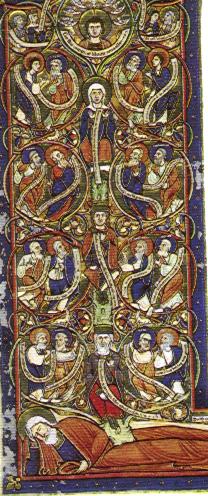FREEDOM IN CHRIST
"We bring nothing into this world and we can take nothing out of it" but many seem to spend a lifetime hoarding possessions and more possessions, whether it be wealth, property or particular objects. Such an attitude can make a person possessive about everything in life and reluctant to let go. When this happens he/she becomes a slave, whether it is recognised or not, to a selfish existence. This is of course what our Lord meant when He talked about serving mammon.
If our lives are cluttered by wanting more of material goods, the further they are divorced from Christ's teaching. If we learn anything from the lives of the saints whom we commemorate throughout the Christian Year, it is the concept of freedom being able through grace to let go of earthly goods and thus not carrying any unwanted baggage in readiness to serve their Lord in prayer and work. That is also the spirit of monastic living.
But it is not only material possessions that can clutter our lives and make it hard to live in accordance with the Gospel but also what I call "spiritual baggage". By this I mean those grievances, retaliations, grudges, hates, jealousies, pettiness and unforgiveness we still carry, often deep inside and perhaps extending a long time back in our lives, even to childhood. These too possess us just as tyrannically and cruelly as material possessions can, as they stifle the work of the Spirit. If we are to live that abundant life promised by Christ these have to be let go of too. Forgiving someone or turning the other cheek by absorbing the hurt is like giving away a piece of prized china.
There is also the clutter of spiritual pride or righteousness a better than thou attitude sometimes. This is just as destructive as the others and it has to go also. This is achieved by acknowledging it is only grace that enables us to accomplish anything. When we realise this then we shall start understanding humility as taught by Christ.
One of the best ways to live in the freedom of Christ and not to clutter our lives with baggage or possessions is to examine our lives through the guidance of the Holy Spirit at the end of each day in our nightly prayers. If we do this honestly we soon become aware in what areas our lives are contrary to Christ's teaching and how often we sin against God and our neighbour. Then when we come to the Eucharist before the Confession (that is why a sensitive priest will always allow time between "let us confess our sins" and "the general confession") we can enumerate those sins we have committed since the last Eucharist.
Another way is to be a penitent and throughout the year to use the sacrament of Penance regularly. For anyone serious in growing in the spiritual life or more Christ-like this is most helpful as not only does the penitent scrutinise his/her life according to the teaching of Christ but also receives help to overcome besetting sins and constructive advice in other areas of one's spiritual life such as prayer and meditation.
Yet another way to learn to be free in Christ is to read the lives of the saints and how they were able to let go and by grace grow in being Christ-like. During this month of August we commemorate two important saints in the conversion of the pagan Anglo-Saxon kingdom of Northumbria - St. Oswald, king of Northumbria on the 5th and St. Aidan, bishop on the 31st. Their holy lives helped to win over the pagans to Christianity by working together in love and humility, and caring for the poor. One example was at one Easter. The two were about to dine when a crowd of poor people gathered begging for alms. Oswald gave them all the food and the money he had on him. Then he had the silverware broken and distributed amongst them. Aidan was so appreciative of this generosity that he grasped the king's right hand and exclaimed. "May this hand never perish!" Shortly afterwards Oswald was killed in battle by a neighbouring heathen king, who hacked his body into pieces. Where this hand fell a holy well sprang up, and survives as a relic in St. Aidan's Church, Bamburgh. Aidan too when given a horse to visit his people by the next king, Oswin, was so uncomfortable about this "possession" that he gave it away to the first beggar who pleaded for alms. Until he died he was content to visit his people on foot, praying as he walked and singing the glories of God in that remarkable Celtic tradition from which he came.
.

